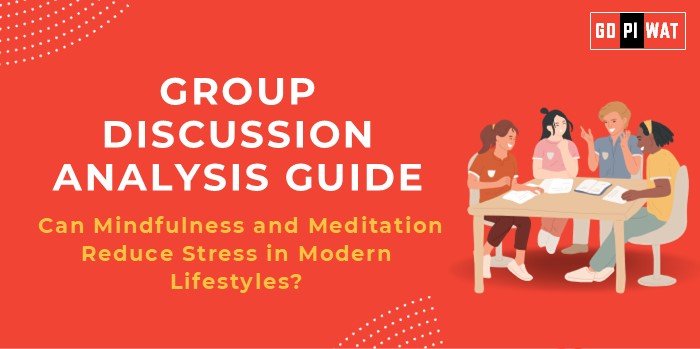📋 Group Discussion (GD) Analysis Guide: Can Mindfulness and Meditation Reduce Stress in Modern Lifestyles?
🌐 Introduction to the Topic
Opening Context: “In an era dominated by deadlines, screens, and fast-paced living, stress has become a ubiquitous companion for modern lifestyles. Mindfulness and meditation are increasingly recognized as essential tools to counteract this growing epidemic.”
Topic Background: Mindfulness, rooted in ancient practices, emphasizes living in the present moment. Meditation, its cornerstone technique, spans cultures and centuries. Modern studies link these practices to reduced stress and improved overall well-being, sparking a global trend in workplaces, schools, and healthcare.
📊 Quick Facts and Key Statistics
– 🧘 Meditation Adoption: 14% of U.S. adults meditate regularly, doubling in the last decade (CDC, 2022).
– 💰 Global Cost of Stress: $300 billion annually in productivity loss (World Health Organization, 2023).
– ❤️ Mindfulness Efficacy: Regular mindfulness practice can reduce symptoms of anxiety and depression by 30-60% (Harvard Medical School).
🤝 Stakeholders and Their Roles
- 🏥 Healthcare Providers: Promote mindfulness for preventative and therapeutic care.
- 🏢 Workplaces: Implement stress-reduction programs to enhance employee productivity.
- 🏫 Educational Institutions: Introduce mindfulness practices to build resilience among students.
- 🧍 Individuals: Integrate mindfulness into daily routines to improve mental well-being.
🏆 Achievements and Challenges
✨ Achievements
- ✅ Scientific Validation: Studies confirm mindfulness reduces cortisol, the primary stress hormone.
- 📈 Workplace Benefits: Companies like Google and Salesforce report increased employee satisfaction after mindfulness programs.
- 📚 School Programs: Initiatives like MindUP demonstrate improved focus and emotional regulation in children.
- 🌐 Global Outreach: Mobile apps like Headspace and Calm make mindfulness accessible worldwide.
⚠️ Challenges
- ⏳ Adoption Barriers: Perception of mindfulness as time-intensive deters participation.
- 🌍 Cultural Differences: Misalignment with traditions in certain societies limits acceptance.
- 📊 Effectiveness Measurement: Long-term benefits are harder to quantify compared to medication.
🌍 Global Comparisons
- 🇺🇸 USA: Mindfulness is a $2 billion industry, integrating into healthcare and corporates.
- 🇯🇵 Japan: Zen meditation remains deeply rooted in traditional and modern practices.
- 🇮🇳 India: Yoga and meditation hubs attract global interest, revitalizing cultural heritage.
💡 Case Studies
- 🇬🇧 UK Schools: Mindfulness programs reduced disciplinary issues by 40%.
- 🔍 Google’s Search Inside Yourself Program: Boosted creativity and team collaboration.
💬 Structured Arguments for Discussion
Supporting Stance: “Mindfulness is a proven antidote to stress, with studies showing reduced anxiety and improved focus among practitioners.”
Opposing Stance: “While beneficial, mindfulness isn’t a one-size-fits-all solution and requires significant time and mindset shifts.”
Balanced Perspective: “Mindfulness and meditation complement other stress management strategies, offering holistic but not universal solutions.”
📚 Effective Discussion Approaches
- 📊 Opening Approaches:
- 📈 Start with Impactful Data: “Stress is responsible for over 60% of illnesses, costing economies billions.”
- 🌟 Quote a Success Story: “In the UK, mindfulness reduced employee burnout by 30% in a year.”
- ❓ Pose a Provocative Question: “Can mindfulness scale as effectively as medicine in treating stress?”
- 🤝 Counter-Argument Handling:
- 💡 Example: “While critics highlight the time commitment, micro-meditation techniques have been successful for busy professionals.”
🔍 Strategic Analysis of Strengths and Weaknesses
– ⚠️ Weaknesses: Requires consistent practice, lacks immediate results, skepticism about scientific validity.
– 🌟 Opportunities: Integration with technology, growth in mental wellness industry, increasing corporate interest.
– ⚠️ Threats: Commercialization risks diluting authenticity, cultural resistance, and lack of trained facilitators.
📈 Connecting with B-School Applications
- 🌍 Real-World Applications:
- Corporate stress management initiatives.
- Operations streamlining through focus-enhancing techniques.
- ❓ Sample Interview Questions:
- 💬 “How would you integrate mindfulness into a high-pressure corporate culture?”
- 💡 “Can meditation be scaled effectively for stress management in underprivileged communities?”
- 📖 Insights for B-School Students:
- Explore mindfulness for personal productivity and focus.
- Analyze case studies on stress-reduction programs in corporate settings.


